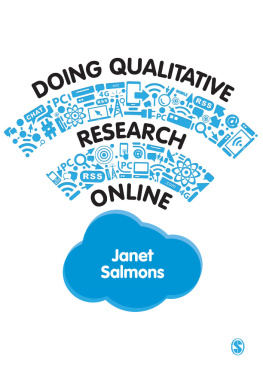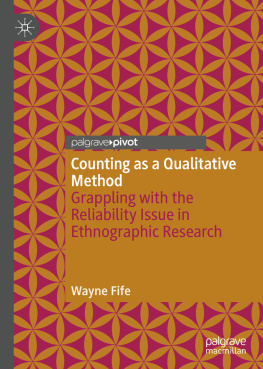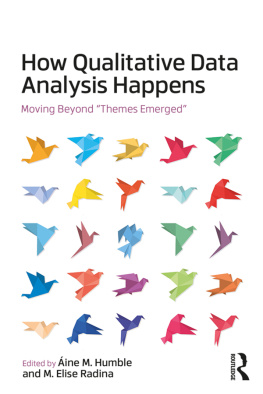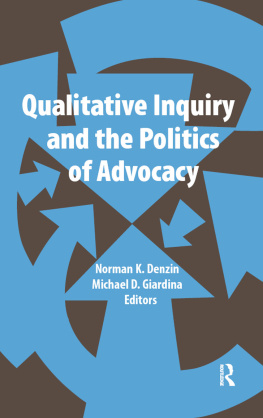
With this playful, poetic, philosophically informed text, Klevan and Grant use autoethnography to trouble tedious, suffocating, and perverse practices and expectations of social research. They offer novel questions about research design, show how we make knowledge happen, and demonstrate the importance of being collaborative and flexible with our research. A brilliant work of friendship and social justice; a necessary read for all qualitative scholars.
Tony E. Adams, Bradley University, USA
Over the past twenty years working collaboratively with David Carless I have experienced first-hand how, by developing caring, relational and non-hierarchical ways of doing research, it is possible to grow as a human being, as well as an academic/ researcher. Becoming a Qualitative Researcher follows such an arc by documenting parallel paths of developing friendship and developing scholarship. The book opens the doctoral journey to scrutiny through phenomenology, narrative and discourse, while also being a warm hearted, deeply relational and provocatively theoretical book. It is full of wonderfully rich and insightful conversations and reflections, while also challenging taken for granted concepts. Alec has always been a cage rattler. Here he shows us, alongside and with Trude, a befriending and collaborative text that has the capacity to nurture and inspire, while also being a companion.
Kitrina Douglas,University of West London, UK
What we have here is a stimulating dialogic conversation between two researchers about friendship, about theory, about life, about the ways we live in this world as researchers, as academics, as scholars, and yet, as friends. Alec and Trude brilliantly challenge our understanding of concepts once thought to be unrelated to academic life or scholarly endeavours by showing, with a very keen sense of awareness, how our existence as scholars is connected to our existence as people living in the world, and in particular the relationships we form as a result of human connection. Kudos to Alec and Trude for making this research palatable, for being brave enough to trouble our understanding of ideas anchored in time (friendship, becoming, truth, curiosity) and giving new meaning, or, should I say, more nuanced meaning to the relevance of these terms as we engage in qualitative research. I walked away from this book questioning everything, which I believe, ultimately, was the goal of the authors. Thank you, Alec and Trude, for making me consider who I am in the process of becoming.
Renata Ferdinand,New York City College of Technology, USA
This elegantly crafted, thought-provoking and passionate book shows the joys, benefits and complications of a novice researcher and a more experienced academic engaging in a collaborative autoethnography to explore the processes involved in continually becoming critical qualitative researchers over time. In the act of writing stories for, and with, one another as friends, in an open-ended, unfinalized and dialogic manner characterized by vulnerability, care, compassion, mutual respect and trust, Trude Klevan and Alec Grant challenge both themselves and their readers to reconceptualize how we make claims to know about the world around us, and how we construct ourselves as qualitative researchers in doing so. They also gift us a range of possibilities and unexpected openings for rewilding the academic self, as part of an autoethnographic project involved in the infinite game that resists and refuses the rationality of the neoliberal academy, which insidiously pervades out daily lives and hollows out our souls. I hope, like me, readers will take the opportunity to immerse themselves in the text and accept the cordial invitation from the authors to join their conversation with a sense of curiosity, and consider where this might take us in the future.
Andrew Sparkes,Leeds Beckett University, UK
AN AUTOETHNOGRAPHY OF BECOMING A QUALITATIVE RESEARCHER
An Autoethnography of Becoming a Qualitative Researcher chronicles Trude Klevans personal experiences of her doctoral journey, with Alec Grant as an external academic resource and friend, and her subsequent entry into the neoliberal higher education environment. It gives a personal and intimate view of what its like to become an academic.
This book is constructed as an extended dialogue which frequently utilizes email exchanges as data. Firmly grounded in the epistemic resource of friendship, it tells the story of the authors symbiotic academic growth around their critical understanding and knowledge of qualitative inquiry and the purposes of such knowledge. The tale told is of the unfolding of a close and mutually beneficial relationship, entangled within sometimes facilitative, sometimes problematic, environmental contexts. It uses these experiences to describe, explore, and critically interrogate some underlying themes of the philosophies, politics, and practices of qualitative inquiry, and of higher education. Disrupting conventional academic norms through their work, friendship, and correspondence, Trude and Alec offer a critical and epistemological view of what its like to become a qualitative researcher, and how we can do things differently in higher education.
This book is suitable for all researchers and students, their supervisors, mentors, and teachers, and academics of qualitative research and autoethnography, and those interested in critiques of higher education.
Trude Klevan is Associate Professor of Mental Health at the University of South-Eastern Norway. Her main research interests are development and exploration of critical approaches in qualitative inquiry and the development of recovery-oriented and collaborative practices in the field of mental health.
Alec Grant is an independent scholar and author. He has been involved in auto-ethnography, narrative, qualitative, and critical inquiry for over 25 years. He is the recipient of the International Conference of Autoethnography (ICAE) 2020 Inaugural Lifetime Contribution Award, and his project for the foreseeable future is to make autoethnography more explicitly philosophical.
Cover image: Tim Grist Photography/Getty Images
First published 2022
by Routledge
2 Park Square, Milton Park, Abingdon, Oxon OX14 4RN
and by Routledge
605 Third Avenue, New York, NY 10158
Routledge is an imprint of the Taylor & Francis Group, an informa business
2022 Trude Klevan and Alec Grant
The right of Trude Klevan and Alec Grant to be identified as authors of this work has been asserted in accordance with sections 77 and 78 of the Copyright, Designs and Patents Act 1988.
All rights reserved. No part of this book may be reprinted or reproduced or utilised in any form or by any electronic, mechanical, or other means, now known or hereafter invented, including photocopying and recording, or in any information storage or retrieval system, without permission in writing from the publishers.
Trademark notice: Product or corporate names may be trademarks or registered trademarks, and are used only for identification and explanation without intent to infringe.
British Library Cataloguing-in-Publication Data
A catalogue record for this book is available from the British Library
Library of Congress Cataloging-in-Publication Data
Names: Klevan, Trude, 1970 author. | Grant, Alec, 1952author.
Title: An autoethnography of becoming a qualitative researcher : a dialogic







